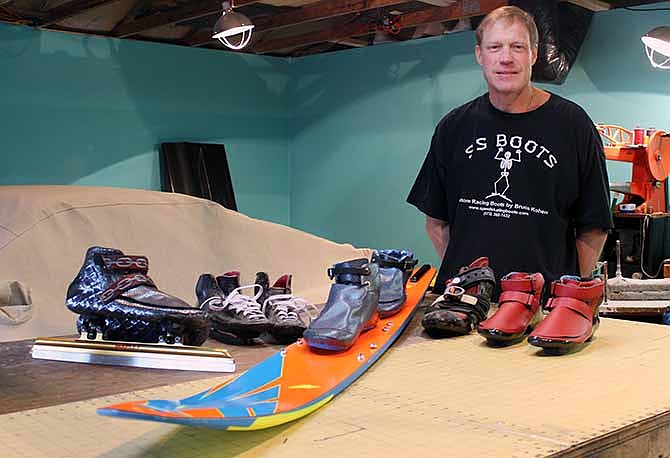Like most miraculous stories of victory, Bruce Kohen's had a humble beginning. Now renowned worldwide for making innovative professional-level speed skates, Kohen started his business, SS Boots, in his basement 16 years ago.
A Jefferson City native, Kohen grew up speed skating from age 7.
"I was really little, and they didn't have skates that fit me," he said. "That was kind of my first adventure in skating: boots that didn't fit."
At the time, most custom skating boots were manufactured in Canada for no small price and a not-so-small waiting period. Since Kohen finished competing by the end of high school, it wasn't worth trying to get a pair.
When he returned to speed skating later in life, his difficulty finding durable boots that fit well became a problem.
"I came back into trying to skate in my 30s and just broke every boot in the market," Kohen said. "It was expensive, and at one point I actually quit skating."
An electrical engineer, he met a few fellow engineers a couple years later while living in Colorado who helped him procure the materials he needed so he would never have that problem again.
"I just started making them one pair at a time for myself," he said.
As more and more speed skaters requested that he make them custom boots like his, Kohen realized he had a business on his hands - or, more accurately, on his feet.
Now living near the Lake of the Ozarks at Rocky Mount, Mo., Kohen crafts the custom skating boots in his workshop and ships his wares to top-level speed skaters worldwide.
For a visual of Kohen's skates, try scanning the television screen as you watch this year's Olympic Winter Games. U.S. standout Chris Creveling, currently in contention for medals in two short-track speed skating events, is sporting a pair of Kohen's boots, as are several Olympic athletes from Russia, Germany, Japan, Austria and Italy.
Canada's star speed skater Charles Hamelin, who has already won a gold medal this year in the 1,500-meter short-track speed skating event, while not wearing Kohen's boots at this year's games, introduced them to Canadian athletes in 2010.
"I made them 10 pairs of boots, and it made me a rock star in Canada," Kohen said.
Hamelin's brother, Francois, won a gold medal wearing Kohen's boots that year, the same year U.S. favorite Apolo Anton Ohno, who also uses Kohen's boots, failed to reach the gold level.
"With all the medals and everything, the highest honor is to have the Canadians coming to Rocky Mount, Missouri, to get their speed skates," Kohen said. "When I was a kid we had to get our skates from up there, and it was an honor to get them from there. For those guys to come here is just huge."
While his operations typically taper down during the Olympics, business tends to pick up about two and a half to three years before the next Olympic Winter Games begin.
"You can't answer the phone fast enough," he said. "You can't get the boots out the door fast enough. It becomes a fight every day to keep the production cycle going."
At $2,100 a pair, each set of boots involves roughly 80 to 100 hours of work. Kohen first takes a negative, or mold, of the skater's foot, then turns it into a positive plaster cast replica. After shaving and plastering, he lays on the materials, including a synthetic suede inner liner and outer leather skin, along with intricate composite and aerospace work.
"In between there, there are a million things going on - stitching, sewing, eyelets, spray glue, shoe glues ... There's a lot that goes into them," Kohen said.
Once he's done all of that, he takes a hammer and chisel to the plaster cast to remove from inside the boot.
As successful as his speed-skate venture has been, Kohen said he'll likely sell his one-man business off to another skate production company within the next few years to focus on the other side of the business, water-skiing boots. Currently in discussions with an interested buyer now, he's unsure of his business' precise future. Especially considering some of the promising young athletes he's currently making skates for - like the United States' Brittany Salmon and Kimi Goetz, whose women's relay team didn't qualify for this year's Olympics - there could be reason for Kohen to stay in the game.
"These are two very young, up-and-coming girls. They're going to set the world on fire," he said. "If I have to keep making them to 2018, it won't be such a bad thing," he said.
But with water-skiing legends like Kris LaPoint already wearing his boots, the next wave of Kohen's business looks promising, as well.
"I've done everything I've ever set out to do," Kohen said. "When I started making skates it was really for me to go faster. I never dreamed they'd ever go to the Games. I had no intention of ever building skates for elite skaters."
For more information about Kohen or his business, see kohensports.com.


